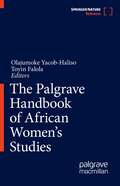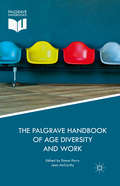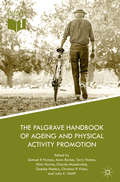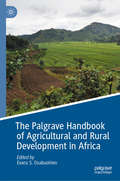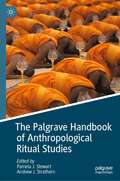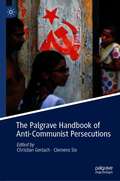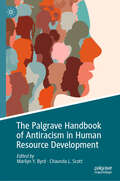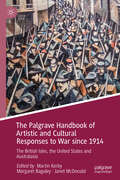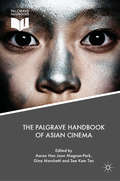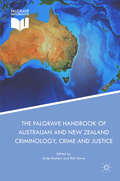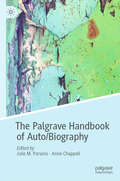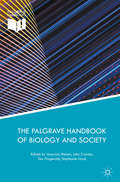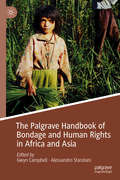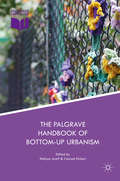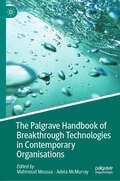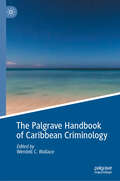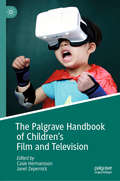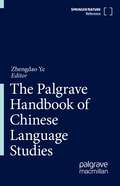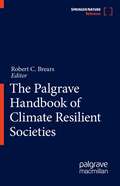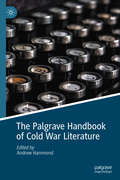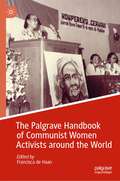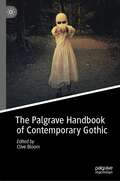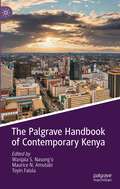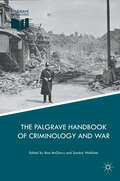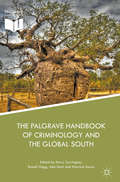- Table View
- List View
The Palgrave Handbook of African Women's Studies
by Toyin Falola Olajumoke Yacob-HalisoThis definitive handbook is the first reference of its kind bringing together knowledge, scholarship, and debates on themes and issues concerning African women everywhere. It unearths, critiques, reviews, analyses, theorizes, synthesizes and evaluates African women’s historical, social, political, economic, local and global lives and experiences with a view to decolonizing the corpus. This Handbook questions the gendered roles and positions of African women and the structures, institutions, and processes of policy, politics, and knowledge production that continually construct, deconstruct, and reconstruct African women and the study of them. Contributors offer a consistent emphasis on debunking erroneous and misleading myths about African women's roles and positions, bringing their previously marginalized stories to relief, and ultimately re-writing their histories. Thus, this Handbook enlarges the scope of the field, challenges its orthodoxies, and engenders new subjects, theories, and approaches. This reference work includes, to the greatest extent possible, the voices of African women themselves as writers of their own stories. The detailed, rigorous and up-to-date analyses in the work represent a variety of theoretical, methodological, and transdisciplinary approaches. This reference work will prove vital in charting new directions for the study of African women, and will reverberate in future studies, generating new debates and engendering further interest.
The Palgrave Handbook of Age Diversity and Work
by Emma Parry Jean MccarthyThis Handbook incorporates a variety of disciplines and approaches in order to provide a comprehensive and authoritative examination of the issues that result from increasing age diversity at work. Despite interest in this area exploding over the past few years amongst academics, practitioners and policy makers, the analysis of age diversity has remained primarily within disciplinary 'silos' such as Psychology or Sociology with a focus on ageing or generational differences, rather than a combination of approaches to understanding age diversity. Unique in its coverage of multiple perspectives, it considers not only generational and ageing perspectives to age diversity, but also highlights the importance of context in driving both the impact and response to this issue. The Palgrave Handbook of Age Diversity and Work includes contributions from leading scholars in age and generational diversity from across the world, discussing cutting-edge research findings about the nature and impact of age diversity and presenting approaches to managing this phenomenon.
The Palgrave Handbook of Ageing and Physical Activity Promotion
by Christina R. Victor Charles Musselwhite Samuel R. Nyman Anna Barker Terry Haines Khim Horton Geeske Peeters Julia Katharina WolffThe ageing of our population is a key societal issue across the globe. Although people are living longer, they need to be living longer in good health to continue to enjoy quality of life and independence and to prevent rises in health and social care costs. This timely and ground-breaking volume will provide an up-to-date overview of the factors that promote physical activity in later life. Despite advances in the fields of gerontology and geriatrics, sports and exercise science, sociology, health psychology, and public health, knowledge is largely contained within disciplines as reflected in the current provision of academic texts on this subject. To truly address the present and substantial societal challenges of population ageing, a multidisciplinary and collaborative approach is required. This handbook will inform researchers, students, and practitioners on the current evidence base for what physical activities need to be promoted among older people and how they can be implemented to maximise engagement. This handbook will be an invaluable resource for researchers, practitioners, policy makers, and students across the social sciences.
The Palgrave Handbook of Agricultural and Rural Development in Africa
by Evans S. OsabuohienThis handbook examines agricultural and rural development in Africa from theoretical, empirical and policy stand points. It discusses the challenges of the United Nations Sustainable Development Goals (SDGs) and assesses how poverty and other development concerns can be addressed in rural communities through agricultural transformation. Additionally, the handbook extends the Post-2015 Development Agenda and it emphasizes the importance of the agricultural sector as it is closely related to the issues of food sustainability, poverty reduction, and employment creation. The contributors suggest multiple evidence-based policies to develop the rural areas through the transformation of the agricultural sector which can significantly benefit the African continent.
The Palgrave Handbook of Anthropological Ritual Studies
by Pamela J. Stewart Andrew J. StrathernRitual Studies have achieved prominence since the 1980s, when interest in ritual as an object of inquiry was established, bridging over a number of humanities and social science disciplines. Both connected with religious studies and independent of it; overlapping with social and cultural anthropology, but also with history; related to science and health practices and ranging across the life course to education, Ritual Studies has come to encompass studies of change and dynamism in social life. Rituals are determinate in form, but not static. They enunciate distinctive social values within specific contexts that frame them; and they relate to the wider concerns and issues of their practitioners.Due to this broad and wide-ranging scope, it is often difficult to find a single resource on Ritual Studies, and even more so to find one which moves beyond the beginnings of anthropological theorizing to grapple with the present-day contexts of ritual. Bringing together recent ethnographies of ritual practice and ritualization from across the globe, this Handbook provides case study of ritual in the light of Emotion and Cognition, Identity, Religious Power, Performance and Literature, Ecology and Ecological Disaster, Media, and other topics. While each chapter provides a deep ethnography of a specific society, ritual, or ritualized practice, each also engages with current theoretical and substantive approaches to the relevant topic. The scholars collected here provide original synoptic and indicative pieces as guideposts and pathways through the complex, varied and cross-disciplinary, and vast landscape of scholarship that constitutes Ritual Studies today and points to developments in the future.
The Palgrave Handbook of Anti-Communist Persecutions
by Christian Gerlach Clemens SixThis handbook explores anti-communism as an overarching phenomenon of twentieth-century global history, showing how anti-communist policies and practices transformed societies around the world. It advances research on anti-communism by looking beyond ideologies and propaganda to uncover how these ideas were put into practice. Case studies examine the role of states and non-state actors in anti-communist persecutions, and cover a range of topics, including social crises, capitalist accumulation and dispossession, political clientelism and warfare. Through its comparative perspective, the handbook reveals striking similarities between different cases from various world regions and highlights the numerous long-term consequences of anti-communism that exceeded by far the struggle against communism in a narrow sense. Contributing to the growing body of work on the social history of mass violence, this volume is an essential resource for students and scholars interested to understand how twentieth-century anti-communist persecutions have shaped societies around the world today.Chapter 7 is available open access under a Creative Commons Attribution 4.0 International License via link.springer.com.
The Palgrave Handbook of Antiracism in Human Resource Development
by Marilyn Y. Byrd Chaunda L. ScottThis handbook examines the development of antiracism, the antithesis of racism, in the field of Human Resource Development (HRD) and discusses its relevance to the workplace and higher education. Contributing authors from HRD and HRD-related fields present their perspectives on anti-racism and explain how their framing of anti-racism makes a contribution to HRD research, theory, and practice. Though antiracism is a critical, emerging topic, it has received limited attention in the literature. Its focus is the eradication of racism while delivering justice and emancipation. This collection advances the concept by highlighting ways that research, theory, and practice are shifting the conversation to dismantling and eliminating racism. It shows how racism has traumatized marginalized individuals, limited their participation in the workforce and society, and hindered their psychological well-being. This Handbook is divided into 4 sections: the historical foundations of racism; knowledge derived from research, theory, and lived experiences; practical application of antiracism in educational and workplace settings; and the future of antiracism research. Coming at a time of racial unrest and much discourse on race, this work provides scholars, professionals, and students with a body of research and practical examples that introduces and informs them on the concept of antiracism in HRD. Though the focus is on the US, the arguments put forth in this handbook are not localized, they are universal and can be applied in multiple contexts.
The Palgrave Handbook of Artistic and Cultural Responses to War since 1914: The British Isles, the United States and Australasia
by Margaret Baguley Martin Kerby Janet McDonaldThis handbook explores a diverse range of artistic and cultural responses to modern conflict, from Mons in the First World War to Kabul in the twenty-first century. With over thirty chapters from an international range of contributors, ranging from the UK to the US and Australia, and working across history, art, literature, and media, it offers a significant interdisciplinary contribution to the study of modern war, and our artistic and cultural responses to it. The handbook is divided into three parts. The first part explores how communities and individuals responded to loss and grief by using art and culture to assimilate the experience as an act of survival and resilience. The second part explores how conflict exerts a powerful influence on the expression and formation of both individual, group, racial, cultural and national identities and the role played by art, literature, and education in this process. The third part moves beyond the actual experience of conflict and its connection with issues of identity to explore how individuals and society have made use of art and culture to commemorate the war. In this way, it offers a unique breadth of vision and perspective, to explore how conflicts have been both represented and remembered since the early twentieth century.
The Palgrave Handbook of Asian Cinema
by Gina Marchetti Aaron Han Magnan-Park See Kam TanThis collection offers new approaches to theorizing Asian film in relation to the history, culture, geopolitics and economics of the continent. Bringing together original essays written by established and emerging scholars, this anthology transcends the limitations of national borders to do justice to the diverse ways in which the cinema shapes Asia geographically and imaginatively in the world today. From the revival of the Silk Road as the “belt and road” of a rising China to historical ruminations on the legacy of colonialism across the continent, the authors argue that the category of “Asian cinema” from Turkey to the edges of the Pacific continues to play a vital role in cutting-edge film research. This handbook will serve as an essential guide for committed scholars, students, and all those interested in the past, present, and possible future of Asian cinema in the 21st century.
The Palgrave Handbook of Australian and New Zealand Criminology, Crime and Justice
by Antje Deckert Rick SarreThis handbook engages key debates in Australian and New Zealand criminology over the last 50 years. In six sections, containing 56 original chapters, leading researchers and practitioners investigate topics such as the history of criminology; crime and justice data; law reform; gangs; youth crime; violent, white collar and rural crime; cybercrime; terrorism; sentencing; Indigenous courts; child witnesses and children of prisoners; police complaints processes; gun laws; alcohol policies; and criminal profiling. Key sections highlight criminological theory and, crucially, Indigenous issues and perspectives on criminal justice. Contributors examine the implications of past and current trends in official data collection, crime policy, and academic investigation to build up an understanding of under-researched and emerging problem areas for future research. An authoritative and comprehensive text, this handbook constitutes a long-awaited and necessary resource for dedicated academics, public policy analysts, and university students.
The Palgrave Handbook of Auto/Biography
by Julie M. Parsons Anne ChappellIn a neo-liberal era concerned with discourses of responsible individualism and the ‘selfie’, there is an increased interest in personal lives and experiences. In contemporary life, the personal is understood to be political and these ideas cut across both the social sciences and humanities.This handbook is specifically concerned with auto/biography, which sits within the field of narrative, complementing biographical and life history research. Some of the contributors emphasise the place of narrative in the construction of auto/biography, whilst others disrupt the perceived boundaries between the individual and the social, the self and the other. The collection has nine sections: creativity and collaboration; families and relationships; epistolary lives; geography; madness; prison lives; professional lives; ‘race’; and social justice and disability. They illustrate the inter- and multi-disciplinary nature of auto/biography as a field. Each section features an introduction from a section editor, many of whom are established researchers and/or members of the British Sociological Association (BSA) Auto/Biography study group. The handbook provided the reader with cutting-edge research from authors at different stages in their careers, and will appeal to those with an interest in auto/biography, auto-ethnography, epistolary traditions, lived experiences, narrative analysis, the arts, education, politics, philosophy, history, personal life, reflexivity, research in practice and the sociology of the everyday.
The Palgrave Handbook of Biology and Society
by Maurizio Meloni John Cromby Des Fitzgerald Stephanie LloydThis comprehensive handbook synthesizes the often-fractured relationship between the study of biology and the study of society. Bringing together a compelling array of interdisciplinary contributions, the authors demonstrate how nuanced attention to both the biological and social sciences opens up novel perspectives upon some of the most significant sociological, anthropological, philosophical and biological questions of our era. The six sections cover topics ranging from genomics and epigenetics, to neuroscience and psychology to social epidemiology and medicine. The authors collaboratively present state-of-the-art research and perspectives in some of the most intriguing areas of what can be called biosocial and biocultural approaches, demonstrating how quickly we are moving beyond the acrimonious debates that characterized the border between biology and society for most of the twentieth century. This landmark volume will be an extremely valuable resource for scholars and practitioners in all areas of the social and biological sciences. Chapter 37 of this book is open access under a CC BY 4. 0 license via link. springer. com.
The Palgrave Handbook of Bondage and Human Rights in Africa and Asia
by Alessandro Stanziani Gwyn CampbellIn the West, human bondage remains synonymous with the Atlantic slave trade. But large slave systems in Africa and Asia predated, co-existed, and overlapped with the Atlantic system—and have persisted in modified forms well into the twenty-first century, posing major threats to political and economic stability within those regions and worldwide. This handbook examines the deep historical roots of unfree labour in Africa and Asia along with its contemporary manifestations. It takes an innovative longue durée perspective in order to link the local and global, the past and present. Contributors trace shifting forms of forced labour in the region since circa 1800, connecting punctual shocks such as environmental crisis, conflict, market instability, and crop failure to human security threats such as impoverishment, violence, migration, kidnapping, and enslavement. Together, these chapters illuminate the historical and contemporary dimensions of bondage in Africa and Asia, with important implications for the fight against modern-day bondage and human trafficking.
The Palgrave Handbook of Bottom-Up Urbanism
by Mahyar Arefi Conrad KickertWho shapes our cities? In an age of increasing urban pluralism, globalization and immigration, decreasing public budgets, and an ongoing crisis of authority among designers and planners, the urban environment is shaped by a number of non-traditional stakeholders. The book surveys the kaleidoscope of views on the agency of urbanism, providing an overview of the various scholarly debates and territories that pertain to bottom-up efforts such as everyday urbanism, DIY urbanism, guerilla urbanism, tactical urbanism, and lean urbanism. Uniquely, this books seeks connections between the various movements by curating a range of views on the past, present, and future of bottom-up urbanism. The contributors also connect the recent trend of bottom-up efforts in the West with urban informality in the Global South, drawing parallels and finding contrast between social and institutional structures across the globe. The book appeals to urbanists in the widest sense of the word: those who shape, study, and improve our urban spaces.
The Palgrave Handbook of Breakthrough Technologies in Contemporary Organisations
by Adela McMurray Mahmoud MoussaThis handbook traverses the broad spectrum of ICT management, engaging readers to consider not only the beneficial transformations triggered by these technologies but also the organisational challenges they present. From the disruption brought about by machine learning to the vast opportunities unleashed by the evolution of big data analytics to the revolution of financial technology (FinTech), this handbook offers a thorough and comprehensive journey through the landscape of ICT. The focus is not solely on the breakthrough technologies themselves, but the intricate patterns of their evolution, adoption, management, and the subsequent ripples they create in the organisational fabric. The handbook challenges current views, provokes new insights, and inspires a futuristic view of managing ICT in the ever-evolving business landscape.
The Palgrave Handbook of Caribbean Criminology
by Wendell C. WallaceThis handbook explores crime, deviance and punishment in the Caribbean with a focus on marginalized perspectives from scholars in the Caribbean. It explores the region’s unique cultural context and challenges, particularly the ongoing influence of colonialism. It also covers types of criminal activities and punishment, including contemporary and emerging areas such as cybercrime and white collar crime, as well as discussing victims and victimization, and crime and justice policies. This handbook builds on the growing field of interest in this region to establish a Caribbean Criminology. It speaks to both students and practitioners.
The Palgrave Handbook of Children's Film and Television
by Casie Hermansson Janet ZepernickThis volume explores film and television for children and youth. While children’s film and television vary in form and content from country to country, their youth audience, ranging from infants to “screenagers”, is the defining feature of the genre and is written into the DNA of the medium itself. This collection offers a contemporary analysis of film and television designed for this important audience, with particular attention to new directions evident in the late twentieth and early twenty-first centuries. With examples drawn from Iran, China, Korea, India, Israel, Eastern Europe, the Philippines, and France, as well as from the United States and the United Kingdom, contributors address a variety of issues ranging from content to production, distribution, marketing, and the use of film, both as object and medium, in education. Through a diverse consideration of media for young infants up to young adults, this volume reveals the newest trends in children’s film and television and its role as both a source of entertainment and pedagogy.
The Palgrave Handbook of Chinese Language Studies
by Zhengdao YeThis new major reference work provides a comprehensive overview of linguistic phenomena in a variety of Sinitic languages in a global context, highlighting the dynamic interaction between these languages and English. This “living reference work” offers a window into the linguistic sphere in China and beyond, and showcases the latest research into diverse and evolving linguistic phenomena that have resulted from intensified interactions between the Sinophone world and other lingua-spheres. The Handbook is divided into five sections. The chapters in Section I (New Research Trends in Chinese Linguistic Research) present fast-growing research areas in Chinese linguistics, particularly those undertaken by scholars based in China. Section II (Interactions of Sinitic Languages) focuses on language-contact situations inside and outside China. The chapters in Section III (Meaning, Culture, Translation) explore the meanings of key cultural concepts, and how ideas move between Chinese and English through translation across various genres. Section IV (New Trends in Teaching Chinese as a Foreign Language) covers new ideas and practices relating to teaching the Chinese language and culture. The final section, Section V (Transference from Chinese to English), explores dynamic interactions between varieties of Chinese and varieties of English, as they play out in multilingual sites and settings
The Palgrave Handbook of Climate Resilient Societies
by Robert C. BrearsThe effects of climate change are beginning to be felt around the world with rising temperatures, changing precipitation levels, more frequent and severe storms and longer more intensive droughts threatening human life and livelihoods and damaging property and infrastructure. As such, society in all countries – both developing and developed – need to increase their resilience to the impacts of climate change, where resilience is the ability of a system to absorb stresses and adapt in ways that improve the overall sustainability of the system; enabling it to be better prepared for future climate change impacts.In this context, a climate resilient society is one that is: reflective (learns from experiences); robust (both people and infrastructure can withstand the impacts of extreme conditions); forward-thinking (with plans made to ensure systems function during extreme events); flexible (so systems and plans can change, evolve or adopt alternative strategies); resourceful (to respond quickly to extreme events); inclusive (so all communities including the vulnerable are involved in planning); and integrated (so people, systems, decision-making and investments are mutually supportive of common goals).The Climate Resilient Societies Major Reference Work includes chapters covering a range of themes that provide readers with an invaluable overview on how various levels of government have attempted to create climate resilient societies. In particular, each chapter, under its respective theme, will address how a government, or series of governments, at various levels in non-OECD and/or OECD countries, have implemented innovative climate resilient policies that seek synergies across strategies, choices and actions, in an attempt to build a climate resilient society. Each chapter will address one specific sub-theme out of the population of themes covered in the Major Reference Work: Water, Energy, Agriculture and Food, Built environment and Infrastructure, Transport, Human health, Society, Disaster, Business and Economy, and Financing Climate Resilience.
The Palgrave Handbook of Cold War Literature
by Andrew HammondThis book offers a comprehensive guide to global literary engagement with the Cold War. Eschewing the common focus on national cultures, the collection defines Cold War literature as an international current focused on the military and ideological conflicts of the age and characterised by styles and approaches that transcended national borders. Drawing on specialists from across the world, the volume analyses the period’s fiction, poetry, drama and autobiographical writings in three sections: dominant concerns (socialism, decolonisation, nuclearism, propaganda, censorship, espionage), common genres (postmodernism, socialism realism, dystopianism, migrant poetry, science fiction, testimonial writing) and regional cultures (Asia, Africa, Oceania, Europe and the Americas). In doing so, the volume forms a landmark contribution to Cold War literary studies which will appeal to all those working on literature of the 1945-1989 period, including specialists in comparative literature, postcolonial literature, contemporary literature and regional literature.
The Palgrave Handbook of Communist Women Activists around the World
by Francisca De HaanThis Handbook addresses the role of women in communism as a global, social and political movement for the first time, exploring their lives, forms of activism, political strategies and transnational networks. Comprising twenty-five chapters, based on new and primary research, the book presents the lives of self-identified communist women from a truly international perspective and outlines their struggles against fascism and colonialism, and for women’s emancipation and national liberation. By using the lens of transnational political biography, the chapters capture the broader picture of these women’s lives, unpacking the links between the so-called public and private, the power structures and inequalities of their societies, the formal networks and politics in which they were involved, and the informal connections and friendships that supported their activism both at the national and international level. Challenging androcentric and Eurocentric narratives about communism, this Handbook reveals the active and significant roles of women in nineteenth- and twentieth-century communist movements and regimes, and highlights the importance of communist women in shaping the agenda for women’s rights worldwide.
The Palgrave Handbook of Contemporary Gothic
by Clive Bloom“Simply put, there is absolutely nothing on the market with the range of ambition of this strikingly eclectic collection of essays. Not only is it impossible to imagine a more comprehensive view of the subject, most readers – even specialists in the subject – will find that there are elements of the Gothic genre here of which they were previously unaware.” - Barry Forshaw, Author of British Gothic Cinema and Sex and Film The Palgrave Handbook of Contemporary Gothic is the most comprehensive compendium of analytic essays on the modern Gothic now available, covering the vast and highly significant period from 1918 to 2019. The Gothic sensibility, over 200 years old, embraces its dark past whilst anticipating the future. From demons and monsters to post- apocalyptic fears and ecological fantasies, Gothic is thriving as never before in the arts and in popular culture. This volume is made up of 62 comprehensive chapters with notes and extended bibliographies contributed by scholars from around the world. The chapters are written not only for those engaged in academic research but also to be accessible to students and dedicated followers of the genre. Each chapter is packed with analysis of the Gothic in both theory and practice, as the genre has mutated and spread over the last hundred years. Starting in 1918 with the impact of film on the genre's development, and moving through its many and varied international incarnations, each chapter chronicles the history of the gothic milieu from the movies to gaming platforms and internet memes, television and theatre. The volume also looks at how Gothic intersects with fashion, music and popular culture: a multi-layered, multi-ethnic, even a trans-gendered experience as we move into the twenty first century.
The Palgrave Handbook of Contemporary Kenya
by Toyin Falola Maurice N. Amutabi Wanjala S. Nasong’oThis volume is a bold attempt to address a comprehensive range of themes and issues relating to contemporary Kenya. It covers independent Kenya’s history, society, culture, economics, politics, and environment with great breadth and depth, comprising thirty-four chapters divided into three parts. Part I focuses on independence and the political economy of development, followed by Part II on environment, globalization, gender, and society. Part III examines the external context’s impact and implications for Kenya and the role of Kenya in the global political economy.
The Palgrave Handbook of Criminology and War
by Sandra Walklate Ross McgarryThis interdisciplinary Handbook brings together into one coherent volume a range of international authors, who firmly establish the relevance of war within the discipline of criminology. The chapters address emerging and prevailing issues in the criminological study of war, including state crime, corporate crime, victimology, genocide, policing, security and various forms of violence. Taking a critical standpoint including feminist, cultural, and radical approaches amongst others, the Handbook is split into five clear sections: (1) The Criminogenic Contexts of War; (2) Violence and Victimization at War; (3) Violence, War and Security; (4) Perpetrators of Violence and the Aftermath of War; and (5) Cultural and Methodological Developments for a Criminology of War. Edited by two leading experts in the field, this Handbook provides an original point of reference on the contemporary debates and applications of criminology and war and will be a key resource for academics and students across criminology, international relations, critical military studies, military sociology, peace studies and law.
The Palgrave Handbook of Criminology and the Global South
by John Scott Kerry Carrington Russell Hogg Máximo SozzoThe first comprehensive collection of its kind, this handbook addresses the problem of knowledge production in criminology, redressing the global imbalance with an original focus on the Global South. Issues of vital criminological research and policy significance abound in the Global South, with important implications for South/North relations as well as global security and justice. In a world of high speed communication technologies and fluid national borders, empire building has shifted from colonising territories to colonising knowledge. The authors of this volume question whose voices, experiences, and theories are reflected in the discipline, and argue that diversity of discourse is more important now than ever before. Approaching the subject from a range of historical, theoretical, and social perspectives, this collection promotes the Global South not only as a space for the production of knowledge, but crucially, as a source of innovative research and theory on crime and justice. Wide-ranging in scope and authoritative in theory, this study will appeal to scholars, activists, policy-makers, and students from a wide range of social science disciplines from both the Global North and South, including criminal justice, human rights, and penology.
